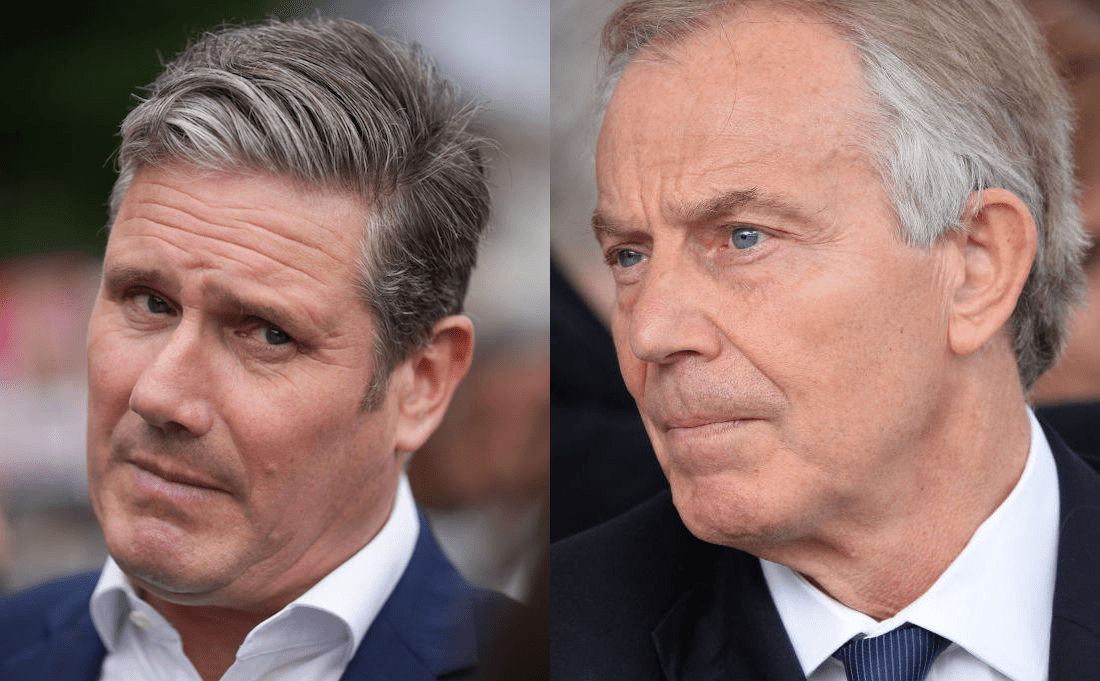In a recent interview Keir Starmer dropped the B-bomb and Labour members are all a chatter about what it means. Speaking to the Financial Times the Labour leader said his party should be ‘very proud’ of what it achieved under Blair and Brown.
As part of Labour’s campaign to regain power for the first time since 2010, Starmer believes the party should remind voters of the good it did when in government, and point out Labour’s successes in reducing poverty, improving the prospects of children and tackling climate change.
This might seem a reasonable thing for the Labour leader to say. But for some on the far left of the party, Starmer’s embrace of Blair in particular has only confirmed their worst suspicions: that despite his claim to want to unify Labour Starmer has always been a ‘Blairite Trojan Horse’. They can point to the extent to which he relies on former Blair advisers in his private office and the support he receives from the ‘Labour to Win’ campaign group, whose members include those who fought most vigorously against the leadership of Jeremy Corbyn.
The suspension of Corbyn from the Parliamentary Labour Party and the expulsion of four far-left organisations deemed inconsistent with the party’s values has only added grist to the left’s mill. To these members, Blair’s tenure as leader of the Labour party – defined for them by his support for the 2003 invasion of Iraq – was a betrayal of all they believe Labour should stand for. One of the party’s 2019 candidates even responded to the Starmer FT interview by declaring: ‘Fuck Starmer and the war criminal he rode in on’.
It’s not just Corbynites who have had a problem with Blair. Delegates at Labour’s 2011 conference booed when Ed Miliband mentioned his name. And one 2015 survey found that nearly three quarters of all voters had a negative view of the former Labour prime minister.
Yet perhaps with time – and four general election defeats for Labour in a row – attitudes are changing. In April YouGov asked party members about their former leaders and found they rated Corbyn and Blair almost equally, while they ranked Gordon Brown the most favourably. A recent Centre for Policy Studies survey also discovered that more voters preferred the Labour party of Blair to that of Starmer or Corbyn. Both within and outside Labour’s ranks it seems that Blair is less toxic than he used to be.
Starmer’s own public position has always been more nuanced. He was overwhelmingly elected leader in 2020 after repeating the mantra: ‘Don’t trash the last Labour government and don’t trash the last four years.’ As someone who opposed the Iraq invasion as unlawful, Starmer has never been an uncritical supporter of the Blair years, and in his Financial Times interview he conceded that New Labour had made mistakes, although understandably he did not care to list them.
The party Starmer now leads has moved on from the free-market policies associated with the Blair years. Austerity and Covid have all left their mark as has the shift to the left associated with the Corbyn years. As I have described elsewhere, Starmer’s Labour is in effect ‘Corbynism with the brakes on’. It is a party that is radical in terms of wanting to use government to achieve key social and economic objectives, such as restoring ‘security’ at the workplace and addressing climate change, but a party where the authority of the leader and MPs has been restored and the taint of anti-Semitism is beginning to be removed.
Starmer hopes to build a brand of reassuring radicalism, shorn of the wilder excesses of the Corbyn years. If reminding voters of what the last Labour government did can help that goal, then Starmer will drop the Blair name when necessary. And if that encourages outrage on the far left and pushes a few more irreconcilable Corbynites to leave Labour and join the likes of the Northern Independence Party, Left Unity or the Workers’ Party of Great Britain, I am sure Starmer will shed few tears.






Comments